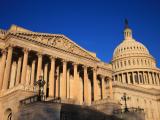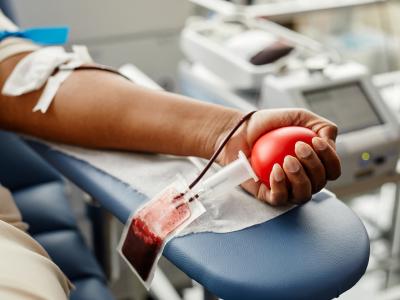May 25, 2005 (CIDRAP News) The Department of Defense (DoD) is seeking a federal appeals court's permission to revive its mandatory anthrax vaccination program, which was stopped by a lower court's ruling in October 2004.
In an appeal filed May 16, DoD is arguing that the lower court judge overrode the Food and Drug Administration's (FDA's) scientific judgment on the vaccine and that the injunction is endangering "countless" service personnel for the sake of the six people who sued to stop the vaccination program.
US District Judge Emmet G. Sullivan in Washington, DC, ruled late in 2003 that the FDA had never specifically approved use of the vaccine for preventing inhalational anthrax. The FDA then affirmed that the vaccine could be used for that purpose, but in October 2004, Sullivan ruled that the agency had ignored its own rules in making that affirmation without inviting public comments.
Last January, the FDA issued an emergency authorization for DoD to resume giving anthrax shots, but only on a voluntary basis. After getting Sullivan's approval of the emergency authorization, DoD announced earlier this month that the voluntary program would go forward. But officials said they would continue to seek authority to restore the mandatory program.
More than 1.3 million people have received the anthrax vaccine, called Anthrax Vaccine Adsorbed (AVA), in the DoD program since 1998. But the vaccine has been dogged by concerns about alleged side effects. Hundreds of service members have refused the shots, and some have been punished or forced out of the military.
DoD appealed Sullivan's ruling to the US Court of Appeals for the District of Columbia Circuit. In its brief, the department argues that Sullivan's ruling "intrudes" into the military's efforts to protect troops from possible anthrax attacks.
"The district court compounded that error by substituting its own judgment of AVA's efficacy for the contrary scientific conclusions of the Food and Drug Administration," the brief states.
It says the FDA has repeatedly confirmed that the vaccine is effective for all forms of anthrax exposure. DoD asserts that Sullivan's ruling relied on the finding of a 1985 FDA advisory committee that the vaccine's "efficacy against inhalation anthrax is not well documented." But the FDA has explained that that conclusion was based on a "misunderstanding" of the data, the brief says.
Moreover, even if the FDA's actions affirming the vaccine were "ineffective," the vaccine's original license granted in 1970 by the National Institutes of Health (NIH) would still be in effect, DoD contends. That license was not limited to particular routes of anthrax exposure. "Formal FDA confirmation of the license was not required to ratify the terms of a license already in existence," the brief states. The NIH was responsible for licensing vaccines and drugs until 1972.
DoD also argues that it is "wholly unnecessary" to stop the entire vaccination program for the sake of the six service members and civilian contractor employees who sued the department over objections to the shots.
"The sweeping injunction . . . sets aside the military's judgment as to the optimal means for protecting against the threat of anthrax without any gain in safety," the brief states. "The interests of thousands of members of the armed forces are not aligned with those of the six plaintiffs. The court's ruling jeopardizes the safety of the countless persons who have never been made part of this action."
Jim Turner, a Pentagon spokesman, said the plaintiffs in the case are due to file a response to the DoD appeal by Jun 30.
A May 23 report by GovExec.com said John Michels, attorney for the plaintiffs, declined to comment on the DoD appeal before the response is filed.

















